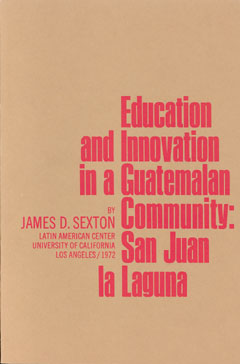 Education
and Innovation in a Guatemalan Community
Education
and Innovation in a Guatemalan Community
 Education
and Innovation in a Guatemalan Community
Education
and Innovation in a Guatemalan Community
Latin American Center
University of California, Los Angeles/ 1972
In comparison with other Latin American countries, Guatemala has an exceptionally high rate of illiteracy, with the greatest concentrations of illiterates located in the rural Indian communities, many of which retain their traditional Mayan culture. One of these villages, San Juan la Laguna, is located on the shores of Lake Atitlán in the western highlands. The population is 98 percent Indian. The Indians of San Juan are descendants of the Tzutuhil-speaking Mayas, and although the majority still speak a Tzutuhil dialect, many have become proficient in Spanish and are bilingual.
This monograph focuses on the relationship between formal education (primary schooling), informal education (mass media, military service, and travel), and innovation (the adoption of modernizing behavior). San Juan was chosen as a field site to test four hypotheses: that Protestants as opposed to Catholics have a more favorable attitude toward formal education; that Indians who have a more favorable attitude toward Ladinos (non-Indians, Hispanically acculturated individuals) have a more favorable attitude toward formal education; that the social interaction of Indians with Ladinos varies directly with the grade completed in school; and that the grade completed in school will correlate positively with the degree of innovation.
Ethnographic techniques are blended with quantitative methods to test those middle range hypotheses and to analyze the relative importance of education in the innovative process.
This monograph is a revision of my master's thesis in anthropology at UCLA, and it was published by the Latin American Center at UCLA. It is now out of print, but some used bookstores are selling it.
Order Education and Innovation in a Guatemalan Community from: AddALL or Amazon.com
|
|